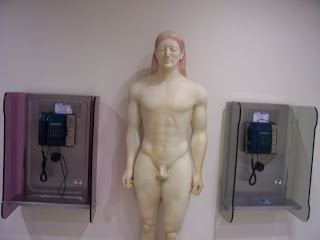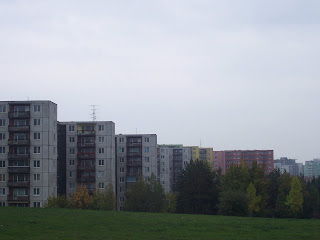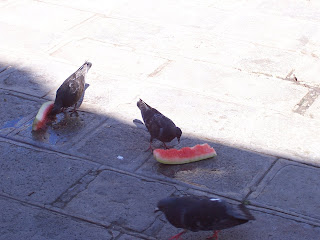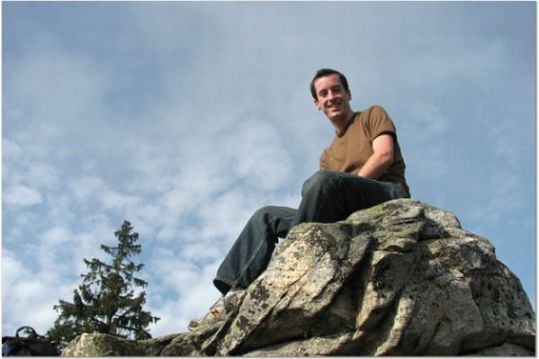What I Did This Summer
 No one suggested I go there. I had never heard anything about Linz. But it was early in the summer, my pack was feeling light, and it was on the way to Salzburg, where I was meeting up with Zuzana:
No one suggested I go there. I had never heard anything about Linz. But it was early in the summer, my pack was feeling light, and it was on the way to Salzburg, where I was meeting up with Zuzana: So I went.
So I went. There's nothing in Linz. There's a cathedral.
There's nothing in Linz. There's a cathedral. There's the Danube.
There's the Danube. I was playing with my used ticket to the modern art museum. On the back of it were some instructions and a diagram. You could turn the glossy paper ticket into a small model of the museum itself:
I was playing with my used ticket to the modern art museum. On the back of it were some instructions and a diagram. You could turn the glossy paper ticket into a small model of the museum itself: 
Thinking of that now reminds me of Sveti Marko in Belgrade. Late in the summer, the weather inexplicably cold, the clouds low and gray and depressing after two straight months of sun. My pack feeling pointless.
This was the day when I knew definitively that my trip was over and I should go home. I went inside the church. Inside, under the gigantic dome, was a smaller version of the church itself--a beehive version, actually:
 And that's exactly what happens when I try to write about a place, or a series of places or a journey: I keep walking into smaller and smaller churches. I have to keep stooping lower and lower to enter.
And that's exactly what happens when I try to write about a place, or a series of places or a journey: I keep walking into smaller and smaller churches. I have to keep stooping lower and lower to enter.And now you've seen all four pictures I took in Linz.
And before I go on talking about my trip, you should know that I don't completely feel up to it.
I want to tell you about where I've been but I'm completely lost. I'm homesick. Heartbroken. Anti-home. Living my life here, but always a little bit angry and estranged.
My country's still at war after all these years. I miss my sisters and my parents. I miss the desert, where I've never lived.
My cousins have joined the army and are fighting. My friends are at home, in Athens, in Texas, in Savannah, helping poor people, sick people. Those numbers are growing.
My country isn't well, and maybe I should be there, helping. In fact, I have absolutely no doubt that I should be there, helping.
But I am here and I have absolutely no doubt that I belong here as well. And every day, in little seductions, this tiny little train-set of a nation confuses...

...and thus seduces me. So as I write there's a double geography in me, and a kind of buzzing guilt which (I hope) knows its place.
I know my place. But still...
Of course, I know I'm not alone. There's this poor darling in the Archeological Museum in Athens:



Rovinj, Croatia


Rethymno, Crete
You are entering forever unfinished
churches and their light isn't
yours yet, like candles leaning
in toward each other, a heat
in your side keeps you moving, keeps
the secretly purposed parts of you moving
in toward each other. Moving
is praying for you.
I guess you imagined yourself
some lost earth's little darling, the one
who'd piece all the varied uses
together: vases and scattered
graves; blacked lines
on a limestone face, a face
with only a nose, and a cannonball buried
deep in its bottom half like a kind of mouth.
The living dog with a brown wound beneath it, howling.
But that cannonball has used every second
and every hour of a thousand years to remain
exactly where it is.
There's a prayer moving faster than you, so fast
and so fractured you
feel it only as continuity.
It was not continuous ever.
Never yours to look at like that, with the bright
leer of some kind of reassembler.


Split, Croatia
Plitvička Jezera, Croatia

Plitvička Jezera



So, it's the middle of September in Brno. A dull drizzle is somewhere between hanging in the air and falling. I'm trying to write something about my trip this summer, a two and a half month journey from the Czech Republic--which occasionally claims to be at the center of Europe--to the south coast of Crete--as far south as you can go before Europe starts being Libya--and back again. It's not easy. There's too much to synthesize. I want to refuse to synthesize. The concrete apartment blocks across from mine, painted in Froot Loop colors a few years ago to make their dreariness more bearable, are sliding back into their romantic communist Czechoslovakian grayness...

Now that I'm not me anymore, it's nice to know that someone else is picking up where I left off, taking moronic pictures of mostly sky, or of only the upper half of some sign.


I saw a lot of churches on this trip. Lots of interiors of churches. I lit a lot of similar candles, stuck in bowls of sand or water, and the candles doubled over in the other candles' heat in similar ways. But I think my three favorite churches were in the last three cities I came to before coming home. Number three: The Rotunda of St. George in Thessaloniki, Greece.
I was the first visitor there in the morning. They were reconstructing it. There was nothing inside but sunlight and scaffolding. A stone altar, looking obviously temporary, awkward in the space around it. And a single worker, up near the ceiling, perched on the wooden planks of the scaffolding, out of my sight. But I could hear him.


Before it was a Byzantine church, this place was a temple to the gods. Maybe the cicada is one of Zeus' dumber incarnations. He had had incredible success with women in the past--as a black bull, a swan. But this time he chose a very unsexy insect to appear as. And the only babe he's managed to attract is an unshaven American tourist.

I walked out of St. George's in Thessaloniki, past the bored slump of the lady on watch, and into the city, which was all very fashionably built in the 50s, around and on top of these Roman and Byzantine ruins. I didn't know what to think about it all.

That's what happens. You walk out of these churches and these museums, into whatever city it is, and you don't know what to think.
You walk out of these churches and they are there, and you're not. They are solid and you're space.
Or you walk into them, and you're there, absolutely, but they aren't, and never could have been.
Sunlight and sawdust. And so you can start to talk about them.
 Venice
Venice Sarajevo, Bosnia and Hercegovina
Sarajevo, Bosnia and Hercegovina Venice
Venice  Split, Croatia
Split, Croatia
Verona, Italy

Padua, Italy
ATTENTION! LOVELY READERS...there's a poem I wrote that should go here. Unfortunately, Blogger is not very poetry-friendly, and I couldn't display it in the necessary format. So PLEASE, if you haven't got the poem already, email me at shnoozie@aol.com and I'll send it to you. 'Cause, like, I want you to see it.
Dubrovnik, Croatia


Sofia, Bulgaria
Here are the 12 countries I visited this summer (and how long I spent in each one). Their names are written in the native language, and then in the languages of all the others (at least all the ones I could find):
Česká republika; Tschechische Republik; Reppublica ceca; Češka republika; Çekia; Τσεχία; Чехия(3 days)
Österreich; Rakousko; Austria; Avstrija; Austrija; Austri; Αυστρία; Австрия (5 days)
Italia; Itálie; Italien; Italija; Itali; Ιταλία; Итaлия (8 days)
Slovenija; Slovinsko; Slowenien; Slovenia; Sloveni; Σλοβενία; Словения (2 days)
Hrvatska; Chorvatsko; Kroatien; Croazia; Hrvaška; Kroaci; Κροατία; Хърватска (11 days)
Bosna i Hercegovina; Bosna a Hercegovina; Bosnien-Herzegowina; Bosnia e Herzegovina; Bosna in Hercegovina; Bosna dhe Hercegovina; Βοσνία και Ερζεγοβίνη; Босна и Херцеговина (3 days) Crna gora; Černá hora; Montenegro; Črna gora; Mali i Zi; Μαυροβούνιο; Чepнoгopия (2 days)
Shqipëria; Albánie; Albanien; Albania; Albanija; Αλβανία; Албания; (3 days)
Македониjа; Makedonie; Mazedonien; Macedonia; Makedonija; Maqedoni; Πρώην Γιουγκοσλαβική Δημοκρατία της Μακεδονίας; Македония (7 days)
Ελλάς; Řecko; Griechenland; Grecia; Grčija; Grčka; Greqia; Гърция (20 days)
България; Bulharsko; Bulgarien; Bulgaria; Bolgarija; Bugarska; Bullgaria; Бугарија; Βουλγαρία(4 days)
Srbija; Srbsko; Serbien; Serbia; Σερβία; Сърбия (2 days)
I especially like ridiculously complicated Greek name for its northern neighbor Macedonia--in English, the Former Yugoslav Republic of Macedonia. Greek pride prevents them from using the name Macedonia for this country, since Macedonia was the name of an ancient Greek kingdom which included some of the territory of what's now the Republic of Macedonia, and which was the homeland of the Greek hero Alexander the Great. The Greeks' stubbornness has led to some bizzare road signs, like this one in Thessaloniki:
 Take a left and go back in time about 20 years...well, you can't fit Πρώην Γιουγκοσλαβική Δημοκρατία της Μακεδονίας on a road sign, can you?
Take a left and go back in time about 20 years...well, you can't fit Πρώην Γιουγκοσλαβική Δημοκρατία της Μακεδονίας on a road sign, can you?And then there's the Macedonian side, which I must admit I have a slight bias towards (first of all, because spending three days in a monastery on a windswept mountaintop in a country...



...kind of predisposes you towards that country---and second, because Macedonia was a brand new country in 1991 and had to pick a name. Asking it to choose something other than Macedonia would be sort of like if New Mexico seceeded from the US, and Mexico demanded that it call itself the Former United States State of New Mexico).
Names and languages and nations are a tricky thing in the Balkans.
If in doubt, speak English.
Of course I tried to learn at least hello, please and thank you in each native language. But in Sofia I told a taxi driver a word which I thought meant train station in Bulgarian. I ended up in some village on the edge of town at the time I should have been catching a train to Belgrade. So I learned my lesson: If in doubt, speak English.
My brain isn't organized enough to map out all the implications of the spread of English as a world language. Maybe the political history that has led to this phenomenon isn't so rosy. But I don't agree with those who claim English is taking over, monopolizing, boxing out the beautiful palette of the world's littler languages. Because it's not. It's actually English that's in "danger." The other day a colleague told me he read somewhere that one sixth of the world's people are currently learning English. I don't know if that's true, but it sounds believable. And if one billion people are speaking English, then they will have the power to alter it, abuse it, fuck it up royally to suit their needs. No one in the US or the UK will have any say in what they do to "our" language. And since I myself like to do nasty things to English, I don't have a big problem with this. English is alive and yummy as an eel. To me, my native language is a hard concrete mystery, and a muddy, sexy thing at the same time, and I love it. I want everyone in the world to speak it--drunkenly, nervously, incorrectly. I want to hear them speak in a language I can understand and not understand a single word they say.
But still I haven't gotten over how strange it is to be in some place you think is nowhere, exotic, inaccessible---some dusty bus station in Bosnia, or Hercegovina---and to hear English spoken over the PA system. Poorly, by some machine. Poetically, mangled by some sign or shop assistant. Or on the last page of a tourist guide called "A Day Through Sarajevo": There is a night in Sarajevo that waits for you.


And when the night I thought was waiting for me
came, it wasn't waiting
for me, but for the woman smoking sitting
on a red and white stack of magazines outside the Applebee's
in Jonesboro, Tennessee. I had traveled
a lot, and I had assumed
that anything that was only a part of the world
couldn't hurt me. What I had assumed
I was vulnerable to in the end was the world
as a whole. The pack of wild dogs
outside the National Museum, the cornflower blue
concrete steps of a small,
otherwise wooden church, a dark red soda called Granat--
I had thought these things would vanish
in the absolute. The absolute would move
its body over the thick bureaucracy
of ponds and ledgered gestures, increments
and sports, and burn it all.
There would be silence and fire.
But there were two kinds of there
in the dictionary I had as a child. One
declaring existence. The other
to say where it had happened. Where she was.
The location of her hair.
In the end it was a detail
that unmade me, and I had to admit
hat somewhere in Nova Scotia, a man was walking
down a small main street, holding a child.
He had never met me
and his teenage niece was walking beside him.
He had nothing to do with you
or me, or our love, and he was the only reason
I had ever been allowed to love you,
and there were an infinite number of other, dissimilar
reasons,
reasons brief
as surface and large as touch.

somewhere between Verona and Padua, Italy
I started playing with that line There is a night in Sarajevo... and I ended up writing that last poem, but everywhere with you instead of the I that's now there. I realized after I wrote it that I needed to claim the speaker's role, that I couldn't make myself into some you like in the other two poems.
The other two poems sound like warnings to me. Warnings to myself, I guess. A warning about things I know already but still need to learn (the first one), and a warning about things that I really have no clue about and am not prepared to deal with (the second).
This last one is something like a statement of belief. But it's not complete.
Some people say they travel to "find themselves."
I don't believe anyone finds themselves while traveling.
 Venice
Venice  Padua
PaduaThen again maybe not.
If you're reading this you know me well enough not to expect some straightforward account of my travels. I'm not a good storyteller. I'm not Bill Bryson.
I want to make you feel what I feel when I'm traveling. I want you to be utterly clueless.
I want your mind to be as fuzzy as mine was that morning in Thessaloniki.
I want you to go eat some breakfast.
Ok, but first, and last, a few pictures with some actual people in them:
 Zuzana and I above Innsbruck, Austria
Zuzana and I above Innsbruck, Austria  and in Sarajevo
and in Sarajevo Eileen with a bunny
Eileen with a bunny Zuzana and Eileen in Mostar, Bosnia and Hercegovina
Zuzana and Eileen in Mostar, Bosnia and Hercegovina  the girls getting ready to enter the Gazi Husrev Bey mosque, Sarajevo
the girls getting ready to enter the Gazi Husrev Bey mosque, Sarajevo



 Zuzka and I on "our" balcony, Dubrovnik
Zuzka and I on "our" balcony, Dubrovnik and me watching the Acropolis...
and me watching the Acropolis...








3 Comments:
Joseph, what can I say. Its fabulous. YOur photos and poetry and general dialogue are simply inspirational. But, of course they would be from my clever, intelligent son. Really, I did love it all and it was worth the wait to hear of your travels. Thanks for bieng my son and thanks for sharing your life with me. Love ya!
I love it all.
I'm intrigued and deliciously, deservingly frustrated by the lack of narrative. But your story is so much more rich and interesting than anyone else's. When you come home it will be so great.
Your mom is adorable, by the way.
hello!,I like your writing very a lot! share we keep in
touch more about your article on AOL? I require a specialist on this space to resolve my problem.
May be that's you! Taking a look forward to see you.
Here is my blog coffee house
Okomentovat
<< Home